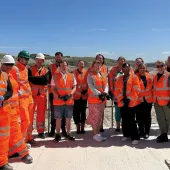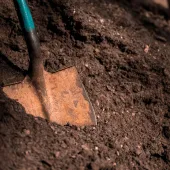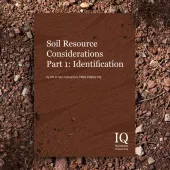The Importance of Independent Quarrying Companies

First published in the February 2017 issue of Quarry Management as Keeping Up with Independent Innovators
A case study on Glendinning Quarry & Concrete Products
The UK quarrying and aggregates sector is dominated by a handful of large, multinational operators. However, the multitude of smaller, privately owned businesses play an increasingly important role in shaping the public’s perception of the industry, as well as fulfilling the construction industry’s insatiable demand for concrete and aggregates.
Glendinning Quarry & Concrete Products are based in Ashburton, Devon. They are the largest independent suppliers of quarry and concrete products both to the trade and direct to the end-user from six sites in Devon and one in Cornwall. Set up by brothers Ernest and Jack Glendinning in 1958, the company’s commercial success has been achieved while retaining the integrity of a true ‘family business’. Family members are still actively involved in the day-to-day running of the business – reflecting their belief in self-reliance and independence.
Local community
Over their 58 years in operation, Glendinning have developed their manufacturing facilities for concrete, asphalt and aggregate-related products. Their Linhay Hill Quarry is part of the fabric of Ashburton and has supplied a range of essential materials – such as aggregates, ready-mixed concretes, asphalt, blocks, paving, sand and lime – for new roads and highways maintenance, building construction and agricultural use throughout Devon.
Managing director Barry Wilson is convinced that the company continues to prosper because it is firmly rooted in its local community and operates on solid principles: ‘We’re lucky enough to live and work in the stunning surrounds of the Dartmoor National Park. With that comes a sense of duty and commitment to serve our community and protect our environment.
‘We’re currently looking to extend our operations to secure the future of the quarry and over 240 local jobs. We need to do this so that the economic benefits and jobs it creates can be safeguarded. It’s about maintaining our current business activity which sustains an estimated 180 further jobs in the wider community and contributes £6 million a year to the Devon and Dartmoor local economy from the procurement of goods and services.
‘As a business we have always been committed to ‘giving back’ to the community in which we live and work, particularly in the field of education and youth development. Over the years we have maintained a very strong involvement with South Dartmoor Community College, we have sponsored a Youth Development project at Newton Abbot Rugby Club and we regularly entertain visitors to Linhay Hill Quarry – from the youngest pupils at our nearest school, Ashburton Primary School, to undergraduate engineers and geologists who come to study the Devonian limestone formation of Linhay Hill.
‘We can do this because the key decision-makers in our business are also local residents and neighbours. We’ve got our ear to the ground and we are nimble on our feet, making decisions that resonate with and benefit the whole of our community, making a real difference to the lives of people in Ashburton.’
Good practice
The public consultation process in support of Glendinning’s quarry extension application is being hailed as an example of ‘good practice’. The company has set up a website (www.linhayhillquarryextension.co.uk) providing information about the application, as well as hosting public meetings and major consultation with Dartmoor National Park Authority.
Barry believes that the business’s local ownership can work to its advantage. ‘Rather than parachute in a team of ‘big hitters’ from head office to sell the benefits of our plans, our pitch is based on securing the long-term prosperity of the local community presented by people who have a stake in the community. It’s this more personal approach that has underpinned our growth over the years. After all, three of our main shareholders still work in the quarry, so it doesn’t get more hands on than that.’
Investing in People
People are at the heart of the continued success of Glendinning Quarry & Concrete Products. The business is aligned to the Institute of Quarrying (IQ) and invests in the continuous professional development of its people. Barry continued: ‘Our commitment as an independent quarry operator is to ensure that our employees receive the same standard of training and skills development that they would expect from a larger operator. That’s achievable because our senior team knows almost every employee by name. It’s this personal level of knowledge that helps shape the way we develop and promote our people so that they can achieve their full potential.’
Barry also recognizes the importance of up-to-date thinking and operational innovation in providing a competitive advantage to the independent sector. He points to the role fulfilled by the IQ, the British Aggregates Association (BAA) and voice of the industry Quarry Management journal. ‘As an independent operator we’re always on the lookout for ideas that can inspire the way we do things. We’re very proud of our own track record of innovation – we opened our own crushed-rock sand-manufacturing plant in response to a market shortage in the South West – but organizations such as IQ and BAA highlight further innovations from which our business can benefit. It’s that sharing of good practice that we really value.
‘That applies right across all areas of our operations. Take health and safety. Embracing good practice is our licence to operate effectively. We’ve embraced the BAA Health & Safety scheme, which we are proud to champion as it is excellent for our sector. We are also more aware of our environmental responsibilities as we’re better informed – and that all stems from greater sharing of information from BAA, IQ and other key players within quarrying.’
The long-term viability of the sector is also a concern to Barry. ‘We need to up our game when it comes to appealing to young people to consider quarrying as a career. We have an experienced but ageing workforce profile. We need an injection of young people with new ideas and innovations who can also draw on the knowledge and expertise of their more mature colleagues.
‘The range of roles the sector has to offer is exceptional, but there’s a perception challenge that we need to get over. We’ve got to be more open and engaging and present the positives of the industry, of which there are many. Reinvigorating the skills base of the industry is essential for our continued competitiveness and prosperity.’
- Subscribe to Quarry Management, the monthly journal for the mineral products industry, to read articles before they appear on Agg-Net.com








